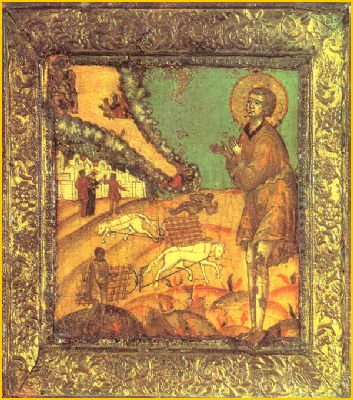|
|||
|---|---|---|---|
| This weekly bulletin insert complements the curriculum published by the Department of Christian Education of the Orthodox Church in America. This and many other Christian Education resources are available at http://dce.oca.org. | |||

Romans 9: 6-19, contains some uncompromising words of Saint Paul. Paul writes that it is God's prerogative to treat people as He wishes to, even when the treatment seems unfair to us human beings. He cites God's words to Moses: "I will have mercy on whom I will have mercy, and compassion on whom I will have compassion." Paul comments that "it depends not upon man's will or exertion, but upon God's mercy." Then Paul acknowledges the injustice that some people might see in this. He writes, "You will say to me then, 'Why does He still find fault? For who can resist His will?'" In other words, why does God judge us if our actions, good or bad, have no effect on our salvation anyway? Paul's answer in the next verses is unequivocal: "But who are you, a man, to answer back to God? Will what is molded say to its molder, 'Why have you made me thus?'" In the chapters that follow, Paul makes clear his certainty that everything God does, including things so hard for us to understand, are part of His plan to bring every willing person to salvation. But for now it is not our place to question or second-guess what He does. Saint Artemius, a sixteenth-century saint, lived in the Russian village of Verkola. He is referred to as a "righteous child wonderworker." The story of his life is another reminder that we shouldn't second-guess God. Even as a small boy, Artemius had been kind, contemplative and quietly cheerful, so that many people called him a child of God. But tragedy struck when he was just twelve. As he was helping his father in the open fields, a thunderstorm came up so quickly that the two had no time to run for shelter. A bolt of lightning struck Artemius dead. Instead of remembering Artemius' godly qualities as signs of God's love, the villagers adhered to the old superstition that his manner of death, at so young an age, was a sign of God's displeasure. They denied him a proper funeral and burial, and his body was left in the forest, covered only by tree branches. But many years later people noticed a light shining over the place where he was lying, and when his body was uncovered it was just as it had always been; there was no corruption or ruin. Realizing that God had shown His young child to be a saint, the villagers took his body to church, and his relics were a source of healing for many. Later a monastery was built with Saint Artemius as its patron. Though the Bolsheviks hacked the young saint's relics to pieces in 1918 and threw them into a well, the power of his example stays strong. We needn't second-guess God about our own destinies, or about those whom He has chosen as His saints. |
|||
